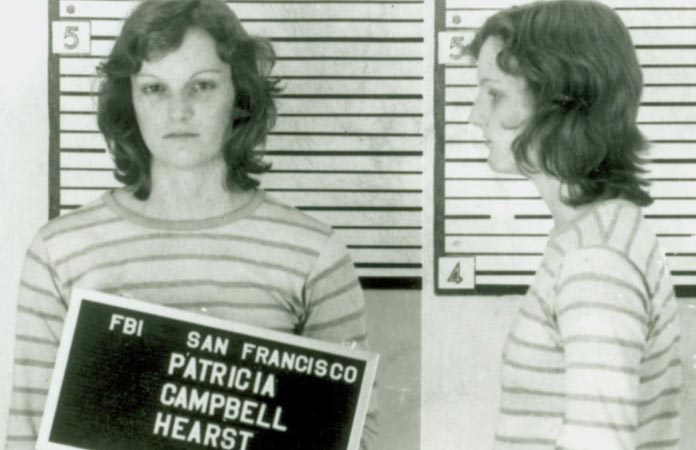Today In Pop Culture: The Breaking Of Patty Hearst
Published on February 4th, 2016 in: Culture Shock, Today In Pop Culture, True Crime |How nice it must be, we think, to come from money. Old money. The kind of money you don’t even realize you have because you’ve had it for so long. Money you didn’t earn. You’re going along, living your life, rich as balls, going to a liberal arts college and wearing sweaters when you don’t have to because you’re rich, and why not?
Then it all comes crashing down, and the next thing you know, you’re wanted for bank robbery.
The year is 1974. Settling down to enjoy a nice evening with her fianceé, Patricia Hearst is summoned by a knock at the door. When she opens it, she is overtaken by three armed intruders, two men and a woman. This is not normal activity for a Berkeley winter evening. Hearst is blindfolded, placed in the trunk of a car, and driven off into the night. Her fianceé and a neighbor are beaten and bound.
The incident makes headlines nationwide, for Patricia Hearst, known as Patty, is the granddaughter of newspaper magnate Randolph Hearst. You know, the guy Orson Welles made Citizen Kane about? The man who ran a smear campaign against marijuana so that usage of hemp fiber wouldn’t interfere with the lumber contracts he had to make paper? He basically got pot banned and still got rich. Imagine how much richer he would have been if he had embraced the sweet leaf, dude.
But that’s not important right now. What is important is that Patty Hearst had been kidnapped by a militant group known as the Symbionese Liberation Army (SLA). Three days later, the SLA sent a letter to a Berkeley radio station claiming that Hearst was a “prisoner of war.” Which specific war she was a prisoner of was not made clear.
The SLA started as a study group, but they became more politicized and radical as time went on. Their leader was Donald DeFreeze, a prison escapee. The SLA viewed every African-American in jail as political prisoners. The irony here is that soon after this new radical stance was taken, DeFreeze became the only African-American in the group. There were more women in the group than anything.
The group’s first demand was that every single needy Californian be given $70 worth of food. Hearst’s father didn’t have that kind of scratch just lying about, so he took out a loan. That ended up being a whopping $4M, in 1974 dollars. But as often happens with charitable donations, the devil was in the details, and the distribution of funds proved problematic. The SLA refused to release Hearst after seeing what a mess Hearst’s people had made of the whole “forced to feed the homeless” thing.
While all this was going on, Hearst was being kept in a closet with her blindfold still on and her hands tied behind her back. According to her own testimony, DeFreeze threatened her with death several times a day. So Hearst figured, if you can’t beat ’em, join ’em. The SLA accepted her into the fold, with such things as weapons training and rape.
Oh, yeah. They raped her. Because when you don’t believe in anything, you don’t care when you do terrible things.
Hearst released a tape announcing her membership in the SLA. She took the name, Tania.
On April 15, 1974, Tania and her cohorts robbed the Hibernia Bank in San Francisco. She was seen on a security tape, shouting at the customers. Some made the argument that she was an unwilling participant in the robbery, but that didn’t fly in the media. Hearst went from an heiress liberal arts student to a leftist guerrilla in a little over two months.
She took part in a few more SLA crimes, shooting at people, but not shooting people. That’s a pretty heavy distinction to make. When she was arrested in September 1975, it wasn’t for murder. Damned near everything else, but not murder.
Hearst’s lawyers claimed she was brainwashed by SLA members. Chunks of her memory were gone, including parts of her life before the abduction. She only weighed 87 pounds. Her defense team called it coercion. The jury called it bullshit and recommended the maximum sentence: 35 years for bank robbery and using a weapon during a felony.
The judge gave her seven years.
In 1979, President Jimmy Carter commuted her sentence to 22 months, which was equal to time served.
In 2001, President Bill Clinton pardoned her.
That, my friends, is what can happen when you’ve got old money.
After prison, she wrote a few books, including a memoir called Every Secret Thing. She also appeared in a few John Waters films, because why not do the most WTF thing possible? But you may recognize her from movies like Pecker and A Dirty Shame. You may not. I don’t know what you watch.
Life takes some weird turns. When it came down to it, the money Patty Hearst’s family had amassed couldn’t help her. It didn’t stop her from being kidnapped, assaulted, and swept down the river to a dead-end revolution. Would you rob a bank if it meant staying alive? We may not all be wealthy, but most us have couches and phones and the illusion of safety. We’ve still got the fight or flight instinct, too. As the saying goes, “To get along, go along,” but you’ve got to wonder what prices can’t be paid with cash, no matter old that money is.

Time limit is exhausted. Please reload the CAPTCHA.